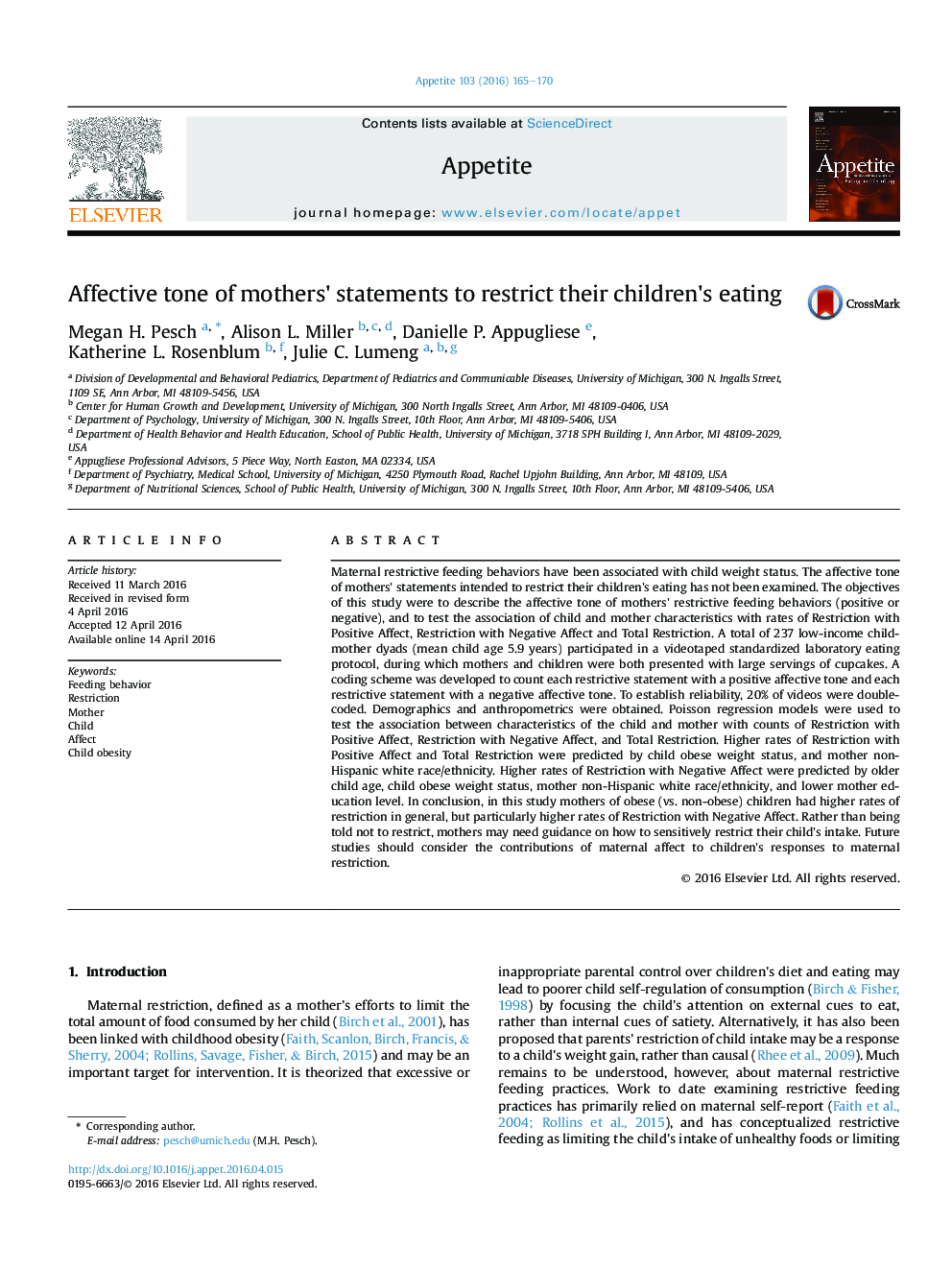| کد مقاله | کد نشریه | سال انتشار | مقاله انگلیسی | نسخه تمام متن |
|---|---|---|---|---|
| 7307302 | 1475377 | 2016 | 6 صفحه PDF | دانلود رایگان |
عنوان انگلیسی مقاله ISI
Affective tone of mothers' statements to restrict their children's eating
ترجمه فارسی عنوان
لحن مضطرب از اظهارات مادران برای محدود کردن خوردن کودکان آنها
دانلود مقاله + سفارش ترجمه
دانلود مقاله ISI انگلیسی
رایگان برای ایرانیان
کلمات کلیدی
رفتار تغذیه، محدودیت مادر، کودک، تاثیر می گذارد، چاقی کودک،
ترجمه چکیده
رفتار تغذیه محدود تغذیه مادران با وزن وزن کودک ارتباط دارد. تناقضات عاطفی مادران در قبال محدود کردن مصرف کودکان آنها مورد بررسی قرار نگرفته است. اهداف این مطالعه، توصیف اهمیت عاطفی تغذیه محدود کننده تغذیه (مثبت یا منفی) مادران و بررسی ارتباط ویژگی های کودک و مادر با میزان محدودیت با تاثیر مثبت، محدودیت با منفی و محدودیت کامل است. در مجموع 237 کودک با مادران کم درآمد (میانگین کودکان 5.9 ساله) در یک پروتکل غذائی آزمایشگاهی استاندارد شده تصویری شرکت کردند که در طی آن مادران و کودکان هر دو با کیک های بزرگ تزئین شده بودند. یک برنامه نویسی برای شمارش هر یک از محدودیت ها با یک لحن عاطفی مثبت و هر جمله محدود کننده با یک علامت عاطفی منفی ایجاد شده است. برای ایجاد اطمینان، 20 درصد از ویدیوها دوبرابر شدند. داده های جمعیتی و تن سنجی به دست آمد. مدل رگرسیون پواسون برای آزمون ارتباط بین ویژگی های کودک و مادر با تعداد محدودیت هایی با تاثیر مثبت، محدودیت با منفی و محدودیت کامل استفاده شد. نرخ های بالاتری از محدودیت با تأثیر مثبت و محدودیت کامل توسط وزن وزن چاق کودک و مادر / غیر نژادی سفید نژاد سفید نژاد / قومیت پیش بینی شده است. نرخ های بالاتر از محدودیت با تأثیر منفی با سن کودک، سن کودک چاق، نژاد نژادی / نژاد سفید غیر نژادی اسپانیایی و سطح تحصیلات پایین تر پیش بینی شده است. در نتیجه، در این مطالعه مادران چاق (در مقایسه با افراد غیر چاق) دارای نرخ بسامد بالاتری بودند اما به ویژه میزان بالاتر از محدودیت با تأثیر منفی. مادران به جای اینکه به آنها محدود نکنند ممکن است نیاز به راهنمایی در مورد چگونگی حساسیت مصرف فرزند خود داشته باشند. مطالعات آینده باید به بررسی تأثیرات مادران بر پاسخ کودکان به محدودیت های مادران بپردازد.
موضوعات مرتبط
علوم زیستی و بیوفناوری
علوم کشاورزی و بیولوژیک
دانش تغذیه
چکیده انگلیسی
Maternal restrictive feeding behaviors have been associated with child weight status. The affective tone of mothers' statements intended to restrict their children's eating has not been examined. The objectives of this study were to describe the affective tone of mothers' restrictive feeding behaviors (positive or negative), and to test the association of child and mother characteristics with rates of Restriction with Positive Affect, Restriction with Negative Affect and Total Restriction. A total of 237 low-income child-mother dyads (mean child age 5.9 years) participated in a videotaped standardized laboratory eating protocol, during which mothers and children were both presented with large servings of cupcakes. A coding scheme was developed to count each restrictive statement with a positive affective tone and each restrictive statement with a negative affective tone. To establish reliability, 20% of videos were double-coded. Demographics and anthropometrics were obtained. Poisson regression models were used to test the association between characteristics of the child and mother with counts of Restriction with Positive Affect, Restriction with Negative Affect, and Total Restriction. Higher rates of Restriction with Positive Affect and Total Restriction were predicted by child obese weight status, and mother non-Hispanic white race/ethnicity. Higher rates of Restriction with Negative Affect were predicted by older child age, child obese weight status, mother non-Hispanic white race/ethnicity, and lower mother education level. In conclusion, in this study mothers of obese (vs. non-obese) children had higher rates of restriction in general, but particularly higher rates of Restriction with Negative Affect. Rather than being told not to restrict, mothers may need guidance on how to sensitively restrict their child's intake. Future studies should consider the contributions of maternal affect to children's responses to maternal restriction.
ناشر
Database: Elsevier - ScienceDirect (ساینس دایرکت)
Journal: Appetite - Volume 103, 1 August 2016, Pages 165-170
Journal: Appetite - Volume 103, 1 August 2016, Pages 165-170
نویسندگان
Megan H. Pesch, Alison L. Miller, Danielle P. Appugliese, Katherine L. Rosenblum, Julie C. Lumeng,
